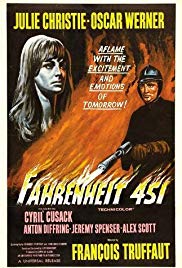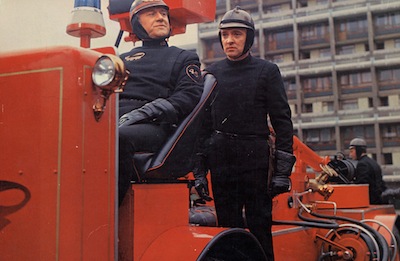FAHRENHEIT 451
SUBJECTS — Science Fiction;
SOCIAL-EMOTIONAL LEARNING — Alcohol and Drug Abuse;
MORAL-ETHICAL EMPHASIS — Respect.
AGE: 12+; No MPAA Rating;
Drama; 1966, 112 minutes; Color. Available from Amazon.com.
There is NO AI content on this website. All content on TeachWithMovies.org has been written by human beings.

SUBJECTS — Science Fiction;
SOCIAL-EMOTIONAL LEARNING — Alcohol and Drug Abuse;
MORAL-ETHICAL EMPHASIS — Respect.
AGE: 12+; No MPAA Rating;
Drama; 1966, 112 minutes; Color. Available from Amazon.com.
TWM offers the following worksheets to keep students’ minds on the movie and direct them to the lessons that can be learned from the film.
Film Study Worksheet for ELA Classes and
Worksheet for Cinematic and Theatrical Elements and Their Effects.
Teachers can modify the movie worksheets to fit the needs of each class. See also TWM’s Movies as Literature Homework Project.
Additional ideas for lesson plans for this movie can be found at TWM’s guide to Lesson Plans Using Film Adaptations of Novels, Short Stories or Plays.
451 degrees Fahrenheit is the temperature at which paper bursts into flame. This adaptation of the classic novel by Ray Bradbury describes a future in which independent thought is discouraged and “firemen” burn books. The population is distracted and sedated by a combination of wall to wall interactive television and mind-altering drugs. But one fireman begins to read the books he’s supposed to burn.

Selected Awards:
None.
Featured Actors:
Oscar Werner, Julie Christie, Cyril Cusack, Anton Diffring.
Director:
Francois Truffaut.
This movie gets children to think about society from a different vantage point. By showing a sterile civilization in which freedom of thought is taboo and reading books a crime, the film helps children understand the value of books and the benefits of liberty. The role of television and drugs as a means of keeping people focused on thoughtless entertainment is also explored by this movie. (Good readers ages 12 and up should be encouraged to read the book before or after the film. This story merits both reading the book and seeing the movie.)
MINOR. The hero turns his flame thrower on the captain of the fire company.
Your child may be required to read the novel in school and it is important that he or she completes the reading before viewing the film. The movie captures the important ideas of this classic novel of the future. Show the film and then ask and help your child to answer the Quick Discussion Question.
1. See Discussion Questions for Use With any Film that is a Work of Fiction.
2. Why was the government shown in this film afraid of people reading books?
Suggested Response:
The government wanted to control what the people read and many, if not most, of the books written in the past did not fit into the party line.
3. What was the reason that this society gave for eliminating books?
Suggested Response:
It claimed that books contained views and statements that were offensive or demeaning to one group or another.
4. What do you think of the reason the government gave for eliminating books?
Suggested Response:
It was just an excuse. The best way to eliminate prejudice is education and more speech in which people challenge the prejudice of others, not less speech. The real reason the government didn’t want people to read was that it wanted to control what the people thought and the books did not fit into the party line.
5. What were the negative effects of the decision by the society shown in the film to eliminate books? What, if any, were the positive effects of that decision?
Suggested Response:
It stopped people from expanding their minds, learning about their world and their past, and enjoying the beauty that was in books. There were no positive effects of this decision. The best way to eliminate prejudice is education and more speech in which people challenge those who are prejudiced, not less speech.
6. What was the role of television in the wife’s life?
Suggested Response:
The purpose of television was to entertain, to fill the time without allowing the viewer to think, and to make up for some of the richness of life that was lost when books were taken away.
7. This world seems very strange to us, but put yourself back in 1900 and list ten of the most important changes that have occurred since that time. In light of that list, is the society envisioned by this movie so farfetched?
Suggested Response:
In 1900, we had the telephone and the telegraph. Cars were a curiosity as was radio, and they didn’t touch the lives of most people. Here is our list of ten. Students should be encouraged to make up their own list. Our ten include: (1) mass produced cars; (2) motion pictures; (3) radio; (4) television; (5) X-rays; (6) nuclear power for peace and war; (7) cell phones; (8) sound recording devices; (9) antibiotics; and (10) computers.
8. Compare the role of drugs in Montague’s society and alcohol (a mind-altering drug) in the former Soviet Union. Did you know that one of the first reforms of Gorbachev, the man responsible for dismantling the Soviet state, was a package of laws designed to discourage the consumption of alcohol?
Suggested Response:
We don’t know the answer to this question. Certainly, alcoholics are not great social activists. Many of them just sit in their drunken stupors.
9. What would life be like if there were no books?
Suggested Response:
There is no one correct response. Our response is that life would be dull and much less rich than it is with books.
10. The German poet Heinrich Heine said, “Where books are burned, they will also ultimately burn human beings.” What did he mean by this?
Suggested Response:
Burning books is a technique of governments and groups of people who don’t want free expression of ideas. But ideas ultimately come from people, who have a habit of talking about their ideas. So, if you are going to burn books to limit the spread of ideas you will soon have to kill people because people are the source of ideas and they will not stop thinking.
11. If all of the books that have been written over the centuries suddenly disappeared and all computer memory that had copies of books were destroyed, what would we have lost?
Suggested Response:
We would have lost much of our cultural heritage and the way to transmit our knowledge about the world and the past.
12. Did Montague have to kill the captain in order to escape? What is the literary significance of burning the captain?
Suggested Response:
The captain could have been neutralized in any number of ways short of death. The irony of the manner of his death is that he was the spokesman for the book burners.
13. There is no real threat in modern society that books will be destroyed wholesale. Instead, certain people and organizations would ban certain books or types of books. Do you agree or disagree with the proposition that banning any book is bad? What about “Mein Kampf?” What about a book that described how to make an atomic bomb and that extolled the misguided ideology of the September 11, 2001 World Trade Center hijackers? What about a book aimed at teenagers that falsely, but convincingly, argued that a dangerous drug, for example Ecstasy, could be taken without a risk of harmful effects? If you come out on the side of banning any books, describe who would set the criteria to determine which books should be banned and who would decide if, for any particular book those criteria applied.
Suggested Response:
There is no one answer to these questions.
See Handout on Alcohol and How it Affects Us
1. Why did the society shown in this film supply the wife with drugs?
Suggested Response:
To keep her from feeling her unhappiness. In any group of unhappy people, some will ultimately agitate for change.
2. What was the role of television and drugs in the society shown in this film and how did they support each other?
Suggested Response:
They both served the same purpose, social control.
3. How would interactive computer games fit into the world of “Fahrenheit 451”?
Suggested Response:
They can be just another type of television or drug.
Discussion Questions Relating to Ethical Issues will facilitate the use of this film to teach ethical principles and critical viewing. Additional questions are set out below.
(Treat others with respect; follow the Golden Rule; Be tolerant of differences; Use good manners, not bad language; Be considerate of the feelings of others; Don’t threaten, hit or hurt anyone; Deal peacefully with anger, insults, and disagreements)
1. Did this society respect the opinions of its people? Describe the reasons for your answer.
Suggested Response:
The society didn’t respect the opinions of people because it sought only to dull their minds and it did not allow them the tools (books, ideas) with which to develop and evaluate their own ideas.
The movie is good but the novel is better. Fahrenheit 451 is one of the classics of science fiction literature suitable for capable readers aged 12 and over. We suggest that parents read the book at the same time as their child and discuss the various themes presented in the book.
Adult science fiction suitable for adolescent readers include: Ender’s Game by Orson Scott Card and Earthchild by Sharon Webb. For a list of science fiction books written in the late 19th and early 20th centuries by Jules Verne, see Learning Guide to “20,000 Leagues Under the Sea“. For science fiction books dealing with time travel, see Learning Guide to “The Time Machine“. For science fiction books dealing with space travel, see Learning Guide to Apollo 13.
There are a number of discussion groups and exchanges of ideas by students and teachers regarding Fahrenheit 451 on the Web. They can be obtained by searching under the title of the book.
This Learning Guide was last updated on August 4, 2010.